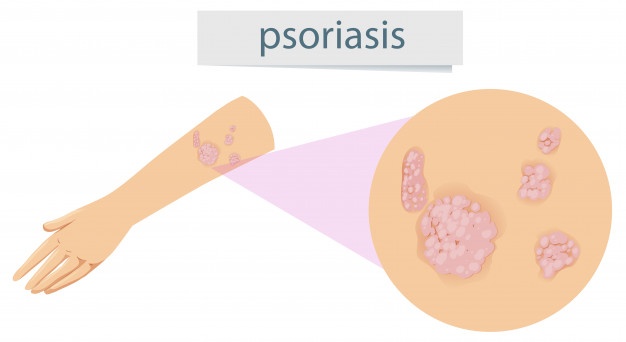To know about Psoriasis Disease
WHAT IS PSORIASIS?
Common symptoms
By type of psoriasis disease, its symptoms will vary from person to person. Some of the common symptoms include
Raised, red, inflamed lesions
Silvery scaly plaques
Small, red, individual spots ( more common in children and youthful grown-ups)
Dry skin leads to crack and bleed
Itching, burning, or soreness of the skin
Leveled nails or separation from the nail bed
Types of psoriasis
There 5 major types of psoriasis
Inverse (flexural)
Erythrodermic
Guttate
Pustular
Plaque
When psoriasis affects further than just the skin?
Some people with psoriasis develop psoriatic arthritis (around 30 in 100 people), a condition that can also affect joints at the ends of fingers, wrists, knees, and ankles. They may become stiff, painful, and swollen. Like psoriasis, there are different types of psoriatic arthritis
Symmetric – affects the joints on both sides of the body, can be disabling, similar to rheumatoid arthritis
Asymmetric – doesn't occur in the same joints on both sides of the body, fingers, and toes may be enlarged and joints may be warm, tender, and red
Distal interphalangeal predominant – occurs in 5 in 100 people and affects the common closest to the nail on finger and toes
Spondylitis – a lump of the spinal column, causing stiffness of the spine at the neck, lower back, and can also be present in the hands, arms, hips, legs, and feet.
Arthritis mutilans – occurs in smaller than 5 in 100 people and is a severe, screwing arthritis that affects small joints of the hands and feet and may get neck or lower back pain
Since psoriasis is an immune disease, it may be associated with an increased threat of hypertension, obesity, elevated lips, heart complaint, diabetes, bowel complaint, carcinoma, and depression.
Cycles, flare-ups & triggers
Utmost types of psoriasis go through cycles. You may witness long ages (weeks or indeed months) of no symptoms, appearing to go into complete remission. But because psoriasis is a chronic (or long-lasting) complaint, symptoms can return, or" flare-up".
Symptom flare-ups can be distressing, having a significant impact on your daily life. They're caused by external factors in the environment, known as triggers. Triggers affect everyone differently. Common symptom triggers include
Stress
Injury to skin
Cold weather
Smoking and Alcohol Consumption
Certain medications




Comments
Post a Comment